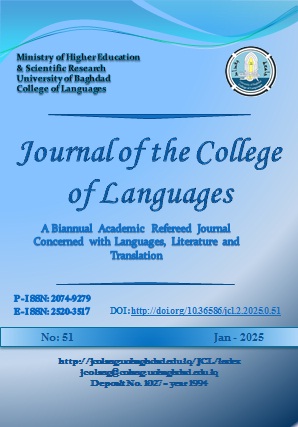The necessity of paying attention to EcocriticismIn reading of literary works
لزوم توجه به نقد بومگرا در خوانش آثار ادبی
DOI:
https://doi.org/10.36586/jcl.2.2025.0.51.0271Keywords:
الأزمة البيئية، النقد البيئي، الادب المعاصرAbstract
Writing and composing about nature has formed a significant volume of literary works since long ago. Poets and writers in genres such as nature writing, pastoral literature, nature-centered poetry have expressed their poetic view towards nature. A view that is shaped according to the lifestyle of man and his relationship with nature, and of course affected by poetic imagination and emotion. The question here is that at the same time as the emergence of the environmental crisis, which was the result of man's entry into the industrial age and man's dominant and instrumental view of nature, what change has occurred in the view of poets and writers on the one hand and in literary criticism on the other hand? What has been the position of literature and literary criticism in the experience of development and what is the relationship between literary works with nature and technology in the contemporary world? Is it possible to imagine a role for literature in the environmental crisis? In this article, we will answer these questions as much as possible and will briefly discuss the response of literature to the environmental crisis in the 20th century under the title of Ecocriticism and the importance and necessity of such an approach in contemporary literature.
نوشتن و سرودن در باره طبیعت از دیرباز تا کنون حجم قابل توجهی از آثار ادبی را شکل داده است و شاعران و نویسندگان در ژانرهایی چون طبیعت نگاری (Nature Writing)، ادبیات شبانی(Pastoral Literature)، اشعار و تغزلات طبیعت محور(nature- center poetry) نگاه شاعرانه خود را نسبت به طبیعت بیان کردهاند. نگاهی که متناسب با سبک زندگی انسان و نوع رابطه او با طبیعت و البته تحت تاثیر تخیل و عاطفه شاعرانه شکل گرفته است. سوال این جاست که با ظهور بحران محیط زیست که دستاورد ورود انسان به عصر صنعت و نگاه سلطه جویانه و ابزاری انسان نسبت به طبیعت بود، نگاه شاعران و نویسندگان از یکسو و نگاه ناقدان ادبی از سوی دیگر چه تحولی پیدا کردهاست؟ موضع ادبیات و نقد ادبی در تجربه توسعه چه بودهاست و چه نسبتی میان آثار ادبی با طبیعت و تکنولوژی در جهان معاصر برقرارست ؟ آیا اصولا نقشی برای ادبیات در بحران محیط زیست میتوان متصور بود؟ در این مقاله تا حد امکان به این سؤالات پاسخ خواهیم داد و به طور خلاصه در باره واکنش ادبیات به بحران محیط زیست در قرن بیستم تحت عنوان نقد بومگرا (Ecocriticism) و اهمیت و لزوم چنین رویکردی در ادبیات معاصر میپردازیم.
References
Alamdari. K(2019) Socialism and the environment from thought to practice. Tehra: Toseeh Publisher.
Carson.R (1979) Silent spring (Translated by Abdul Hossein Wahabzadeh, Awaz Kochaki, Amin Alizadeh). Mashhad: Institute of Printing, Publishing and Graphics, Ferdowsi University.
Glotfelty.Ch and Fromm, H (1995) The Ecocriticism Reader; Landmarks in Literary Ecology. Athens and London: The University of Georgia Press
Karbasizadeh, A; Shiravand, Mohsen (2013). "The role and position of Francis Bacon's teachings in the generation of environmental crises" Islamic University Epistemological Quarterly, 18 (3) 469-485.
Moshiri. F (1376) Moments and feelings. Tehran: Sokhn.
Nasr. S.H (2009) Religion and order of nature. (Translated by Enshaallah Rahmati). Tehran: Ney.
Parsapoor,Z (2016) Green literature, a collection of essays on ecological criticism of Persian literature. Tehran: The Institute of Humanities and Cultural Studies.
Parsapoor,Z (2021) Earth ethics. Criticism of mystical and literary texts with the approach of environmental ethics. Tehran: The Institute of Humanities and Cultural Studies.
Rigby, K(2002)Ecocriticism. In J. Wolfreys(Ed), Introducing Criticism at the 21th century, Edinburgh Press. (P 151-178)
Shariati, A(1970) Desert.?.
Sutton, W(2014) An introduction to environmental sociology. )Translated by Sadegh Salehi(. Tehran: The Institute of Humanities and Cultural Studies.
Tošić, Jelica(2006)“Ecocriticism; Interdisciplinary Study of Literature and Environment”, Facta Universitatis(Series: Working and Living Environmental Protection) Vol 3(N1), 43-50; In:
> http://facta.junis.ni.ac.rs/walep/walep2006/walep2006-06.pdf.
Downloads
Published
Issue
Section
License
Copyright (c) 2025 Journal of the College of Languages (JCL)

This work is licensed under a Creative Commons Attribution 4.0 International License.








